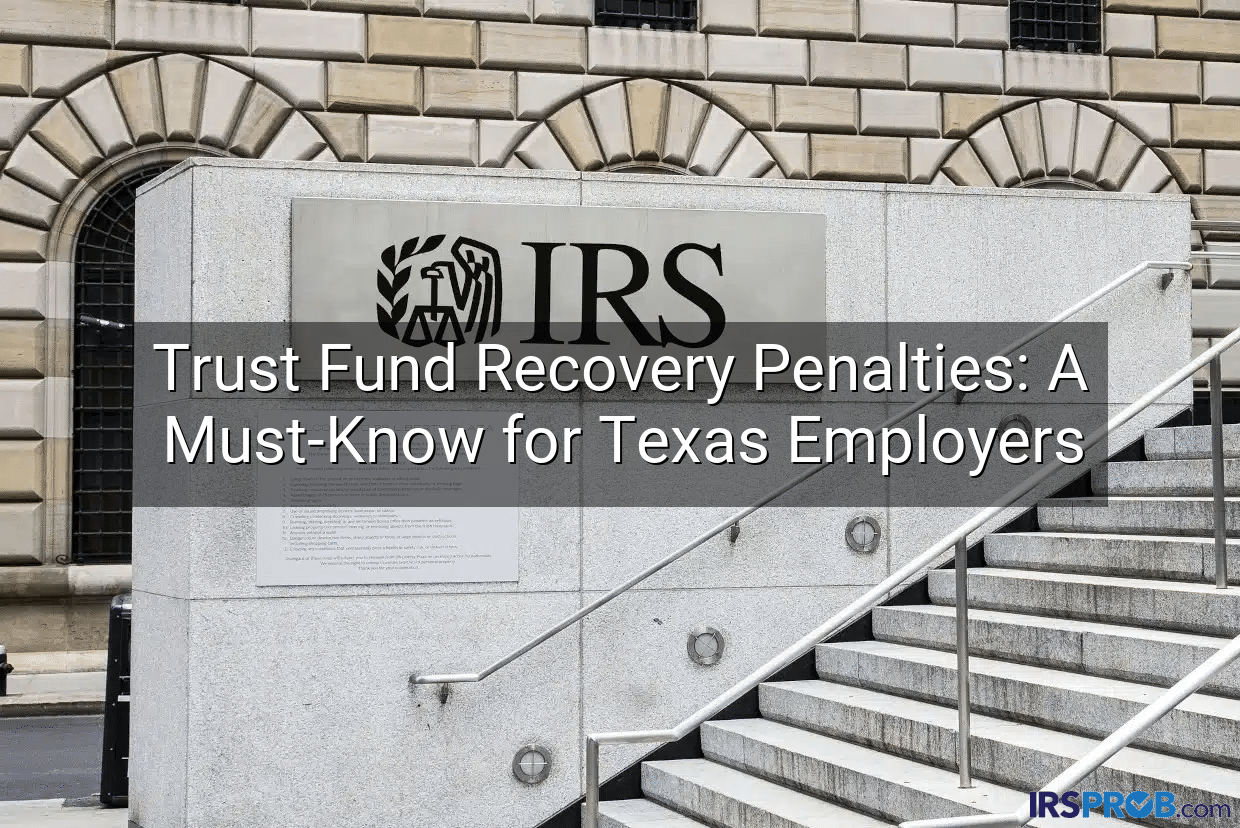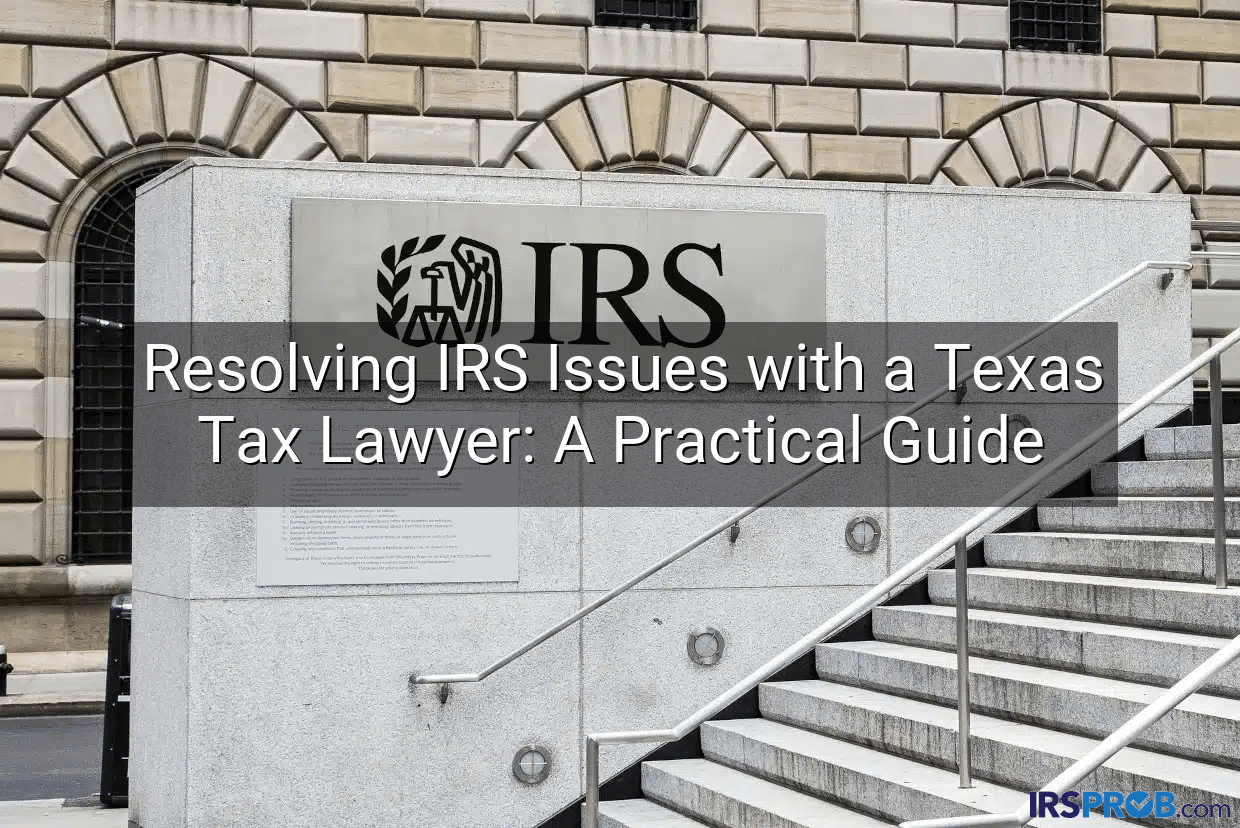Understanding Trust Fund Recovery Penalties
Trust fund recovery penalties are a critical area of IRS enforcement aimed at ensuring that employers fully meet their tax obligations. These penalties specifically target the unpaid federal taxes that are held in trust for employees—such as income taxes, Social Security, and Medicare taxes. The IRS holds individuals who are responsible for ensuring these taxes are deposited, including business owners and high-level executives, personally liable for repaying these sums if the employer fails to remit them in a timely manner.
The purpose of these penalties is to compel responsible management of withheld taxes. If an employer is negligent, the IRS may impose substantial penalties, ultimately affecting the financial stability of the business. This can result in severe consequences including liens, levies, or even criminal charges in extreme cases where fraud or blatant disregard for tax payment responsibilities is evident.
This section highlights the core mechanisms behind trust fund recovery penalties and emphasizes the importance of strict adherence to tax deposit requirements.
The Impact of Trust Fund Penalties on Texas Employers
For employers operating in Texas, trust fund recovery penalties can introduce an additional layer of complexity to tax management. Texas employers must ensure that all withheld taxes are remitted promptly since failing to do so will not only trigger penalties but may also compromise the financial health of the business. In Texas, where businesses often operate on tight payroll schedules and strict budget constraints, the repercussions of such penalties can be significant.
When penalties are imposed due to non-remittance, employers face not only augmented financial burdens but also potential losses in employee trust and operational disruptions. The impact of trust fund penalties extends beyond immediate financial costs. It can affect business reputation, investor confidence, and may lead to more rigorous IRS scrutiny in the future.
Addressing these issues requires proactive measures in tax administration, regular audits, and effective communication between internal accounting teams and tax professionals. Maintaining accurate records and establishing robust internal controls are fundamental practices for mitigating this risk.
Financial Consequences and Business Disruptions
One of the harsh realities of trust fund recovery penalties is the direct financial strain imposed on businesses that fail to comply. The IRS may hold responsible parties personally accountable for outstanding taxes, compounding both personal and corporate financial liabilities. In the worst-case scenarios, these penalties can result in unexpected cash flow shortages, putting a strain on the overall financial operations of the business.
In addition to the monetary fines, the imposition of trust fund penalties may lead to additional fees and interest accruals. These extra costs, when combined with the base penalty amounts, can swiftly escalate into a significant financial burden. Often, these penalties also necessitate costly legal consultations and further administrative costs, taking valuable resources away from vital business operations.
Small to mid-sized enterprises, in particular, might find it challenging to manage these additional expenditures given their limited financial reserves. Financial planning must, therefore, include potential penalties and build in contingencies that protect the business from unexpected fiscal shocks.
Common Compliance Issues and Pitfalls for Texas Employers
Due to the complex nature of tax regulations, many Texas employers encounter common compliance issues that set the stage for trust fund recovery penalties. Some of the most frequent pitfalls include misclassification of employees, delayed deposits, and inaccurate payroll reporting. Such oversights, though sometimes inadvertent, can escalate quickly into significant compliance violations under IRS scrutiny.
Misclassification of employees may lead to incorrect withholding amounts and may undermine an employer’s obligations under federal law. Additionally, delays in remitting withheld taxes may occur due to manual processing errors, inadequate internal controls, or even simple cash flow problems. These delays, however unintentional, often trigger harsh penalties that can affect both the business and its leadership.
Moreover, inadequate record keeping or the mismanagement of payroll systems can result in discrepancies during IRS audits. Regular internal audits, employee training, and leveraging modern payroll technology can provide safeguards against these common pitfalls.
Navigating IRS Investigations and Enforcement Measures
The IRS takes non-compliance with tax deposit requirements very seriously, and any indication of potential wrongdoing can trigger an intensive investigation. For Texas employers, an IRS investigation into trust fund recovery penalties can be both time-consuming and disruptive. Navigating this process requires immediate action, transparency, and effective legal representation.
During an IRS investigation, businesses may face requests for extensive records, interviews with responsible parties, or on-site audits. It is imperative that Texas employers have accurate and detailed documentation readily available to substantiate that all necessary steps were taken to comply with tax deposit requirements.
Moreover, the nature of these investigations means that the responsible parties, not the business as a whole, can be held personally liable for unpaid taxes. This highlights the importance of ensuring that all payroll actions are executed with precision and accountability. Companies should invest in professional tax advisors and legal experts to help navigate these challenges and to negotiate the best possible outcomes in the face of potential penalties.
Preventative Measures and Compliance Strategies
Developing a proactive compliance strategy is essential for Texas employers striving to avoid trust fund recovery penalties. One of the most effective measures is establishing robust internal controls. This includes the regular reconciliation of withheld tax accounts, prompt remittance of taxes, and the integration of automated payroll systems that minimize human error.
Investing in comprehensive employee and management training programs in tax compliance can dramatically reduce the occurrence of errors. Regular workshops and updates on tax law changes empower employees to perform their roles with a deeper understanding of their responsibilities. Additionally, partnering with experienced tax advisors who are well-versed in IRS procedures can offer an extra layer of protection.
Another important step is the periodic review of financial processes with internal or external audits. Audits provide an unbiased evaluation of the company’s compliance practices and can identify any procedural gaps before they escalate into more significant penalties. By taking these preventive measures, employers not only safeguard their finances but also maintain a strong operational reputation with the IRS.
Legal and Professional Guidance for Mitigating Risks
Engaging with legal and professional tax advisors is one of the most effective ways for Texas employers to mitigate the risks associated with trust fund recovery penalties. Legal professionals who specialize in tax law can offer insights into the complexities of IRS regulations and help develop a comprehensive strategy to ensure compliance.
In addition to legal counsel, many employers benefit from hiring certified public accountants (CPAs) and payroll specialists who can manage the intricacies of payroll systems and tax deposits. These professionals can conduct thorough reviews of payroll operations, identify potential vulnerabilities, and implement corrective measures before they become significant issues.
When facing potential IRS investigations or disputes over penalties, having professional guidance can make a remarkable difference in the outcome. An experienced team can assist in negotiating with the IRS and may help secure reductions or eliminations of penalties where justified by a company’s compliance history or mitigating circumstances.
Planning for Future Growth and Compliance
As a business grows, so does the complexity of its payroll and tax obligations. Texas employers need to plan proactively for future growth by integrating scalable compliance strategies. This means adapting payroll systems to incorporate new technologies, conducting regular training, and continuously reviewing compliance protocols as the business expands.
Growth comes with changing risks, and what worked for a small business may not be sufficient as the company scales. Employers must regularly evaluate their internal controls and invest in advanced payroll software and human resource systems that provide real-time monitoring of tax deposits and withholdings.
Preparing for future expansion also involves maintaining open communication with tax professionals and legal advisors. Ensuring that your compliance measures evolve in tandem with changes in tax law is crucial. By doing so, you not only protect your company from future IRS penalties but also build a resilient infrastructure that supports sustainable growth.
Pro Tips from IRS Prob
Pro Tip #1: Maintain Robust Internal Controls
Implement comprehensive internal controls that include regular reconciliations of payroll, automated reminders for tax deposit deadlines, and periodic internal audits. Ensuring that your payroll processes are consistently reviewed and updated can prevent errors and provide a clear audit trail in case of IRS inquiries.
Pro Tip #2: Invest in Professional Training
Keep your team updated on the latest tax laws and IRS guidelines through periodic training sessions. An informed payroll and finance team reduces the chances of errors that may lead to trust fund recovery penalties, and ensures that all team members understand their roles in maintaining tax compliance.
Pro Tip #3: Leverage Expert Advisors
When in doubt, engage with tax professionals and legal advisors who specialize in IRS compliance. Their expertise can help you identify potential areas of risk, optimize your payroll processes, and provide valuable insights into the ever-evolving landscape of trust fund tax regulations, specifically for Texas employers.
The intricate nature of trust fund recovery penalties demands that Texas employers take an assertive approach to compliance and risk management. The consequences of failing to remit withheld taxes are severe, impacting not only the financial integrity of your business but also its long-term reputation and operational stability. By understanding the stakes, maintaining meticulous records, and employing advanced payroll and compliance strategies, you can safeguard against these penalties. Continuous education through training, internal audits, and consultations with expert advisors will ensure that you remain updated on the latest regulations and best practices. With robust internal controls in place and a proactive compliance strategy, Texas employers can successfully navigate the complexities of trust fund recovery penalties and focus on growing their businesses without the fear of unexpected fines or legal complications.
This blog post serves as an in-depth guide to understanding and managing trust fund recovery penalties. By dissecting the various aspects—from the fundamental definitions and implications to practical prevention strategies and expert advice—employers can arm themselves with the knowledge needed to not only avoid costly pitfalls but also to build a secure financial foundation moving forward. The key to success is vigilance, ongoing education, and professional guidance.









